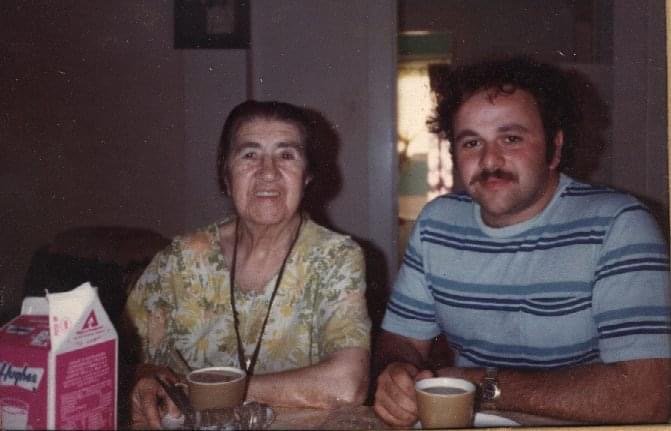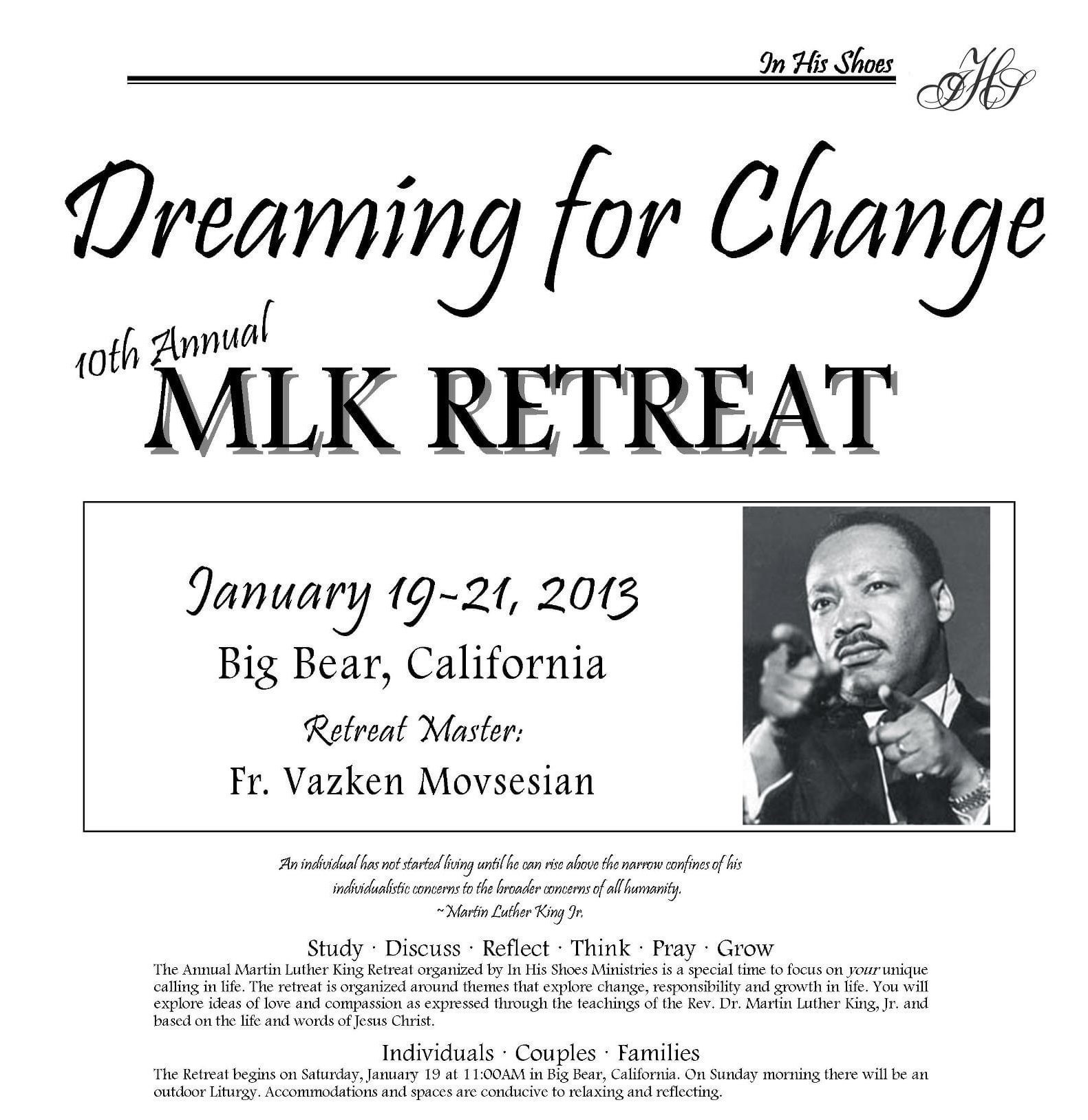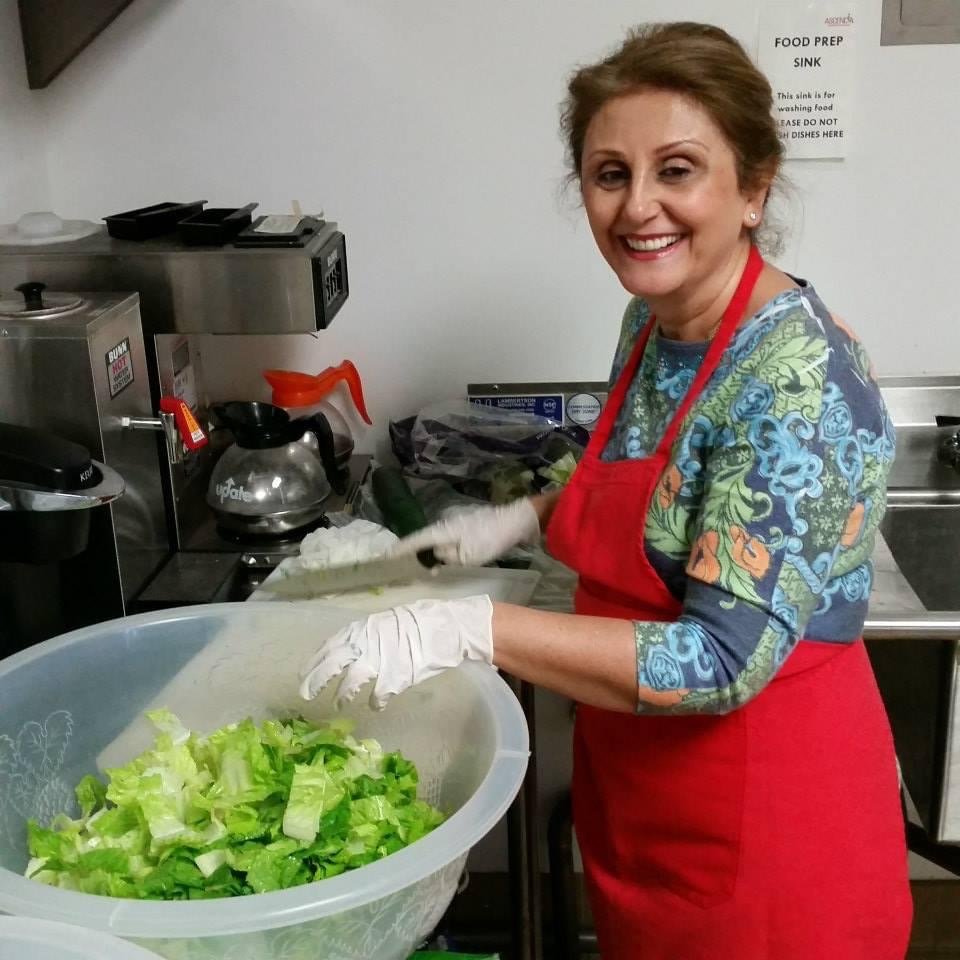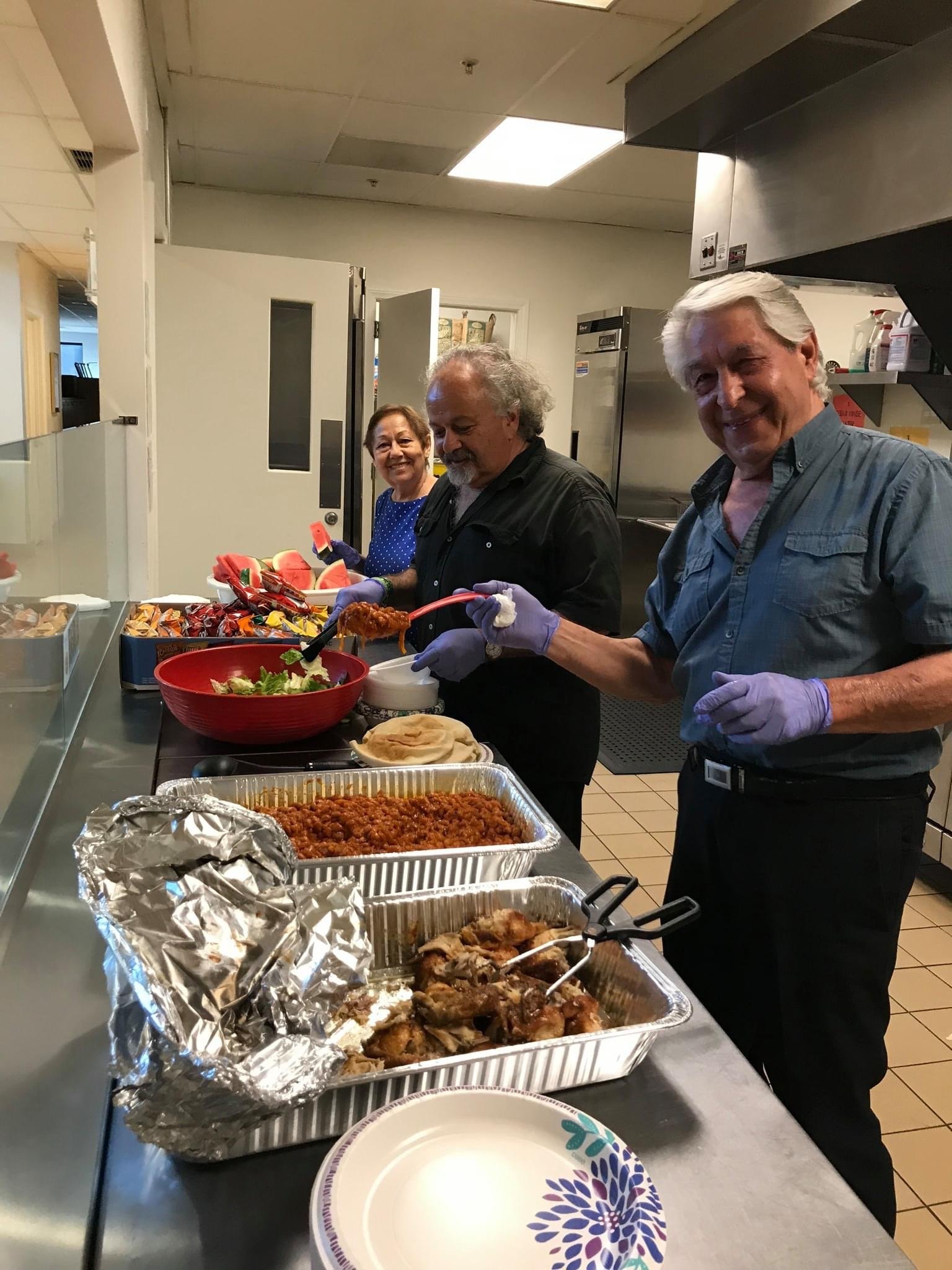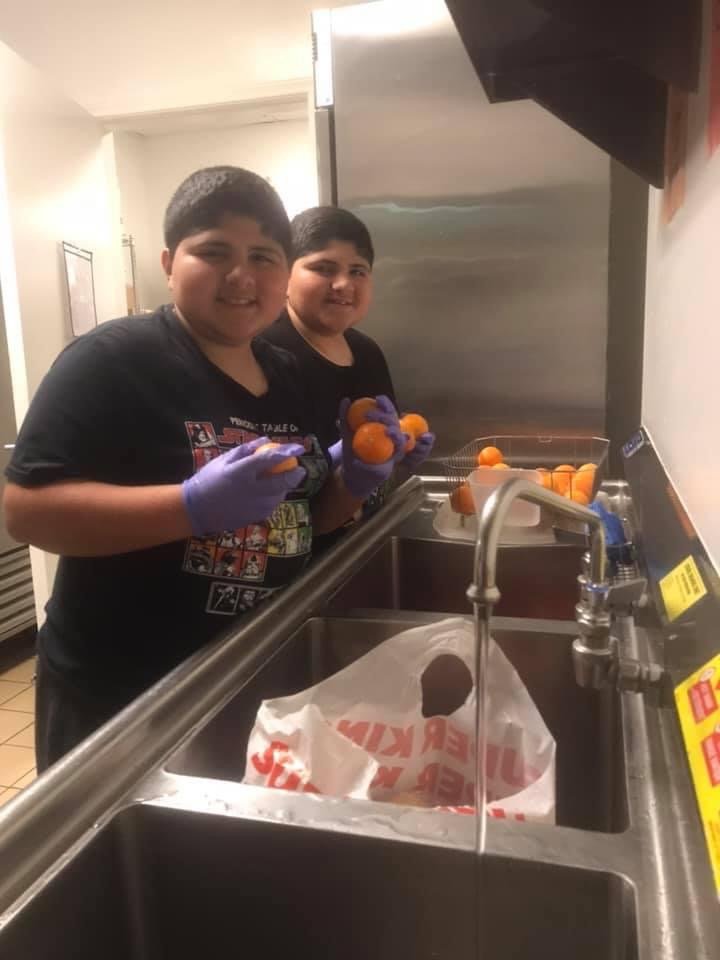Der Vazken Movsesian, The people’s priest
February 1, 2022
Our #ArmenianAmericanSpotlight highlights the work
of community heroes, organizers, advocates, and artists in the U.S. Armenian community
Father Vazken Movsesian is a priest of the Armenian Church and has been an activist for the past four decades. In 2003, Fr. Vazken established the In His Shoes organization. From holding a retreat for Armenian-Americans to study the teachings of Martin Luther Kings Jr. for almost twenty years and joining water protectors at Standing Rock, to building with other genocide refugee communities trasnationally and leading community members in service whether with the incarcerated and homeless in Los Angeles or for the displaced in Artsakh, Movsesian is making change in the everyday work. We at Armenian America, as part of the #ArmenianAmericanSpotlight series, sat down with Armenian priest Father Vazken Movsesian to speak on love, his decades-long movement work, and the spirit of faith.
Armenian America (AA): Where were you born, and where did you grow up? How did your Armenian identity shape you into the person you are today?
Movsesian in his youth with his grandmother, an Armenian Genocide survivor
Father Vazken Movsesian: Born and raised in Los Angeles. Armenian identity always played as a counter-weight to my balance, that is, if the goal of the "melting pot" of America is assimilation, Armenian identity becomes your lifeboat to personhood. For me, Armenian identity has been and is, what Thoreau refers to as, the "beat of the different drummer." It's unique and measured at a different syncopation. Accordingly, in the melting-pot metaphor, it is the unique flavor that spices up life.
AA: What subjects do you take on in your work and why? How do you see these as issues of social and global justice?
Father Vazken: As a priest, my life has been filled with a variety of different events, people and challenges. The common thread that brings them all together is my faith. It's as simple as this: Jesus began his ministry by announcing his purpose, “To preach the gospel to the poor, to heal the brokenhearted, to proclaim liberty to the captives, recovery of sight to the blind, to set at liberty those who are oppressed..." If that was his mission and I dare to call myself a follower of Jesus Christ, I understand that the same mission is mine. The issues which we package under the banner of social and global justice have to do with the same group of people Jesus spoke of - the poor, the brokenhearted, the captives and the oppressed. As for the blind, that's one of the biggest diseases of humanity, we have eyes but we don't see beauty. We don't recognize ourselves in our neighbors. Bringing justice to the world begins when we can understand the plight of our fellow human beings, when we walk in their shoes and realize we are here for each other.
Members of In His Shoes making and serving dinner to the homeless in Los Angeles, CA
AA: What first inspired you to action? Can you name two moments that helped change your trajectory in life toward the work you do today?
Father Vazken: I've been inspired by many-many people and events. It's difficult to single out any particular person or event because I'm still being inspired by people today. Of course, my parents and my grandparents were early inspirations. The fact that they survived Genocide, that they reconstructed their lives from nothing, is miraculous. The fact that they continued to laugh and sing pointed to their refusal to take on the label of victim, instead they celebrated life as victors. Coupled with this post-genocide attitude was the time in which I grew up. The counter culture of the 60's, the assassination of JFK, MLK, RFK, the war in Vietnam, the anti-war or peace movement, the Jesus-revolution, Woodstock, the music, the British invasion, the space-race and moon landing, the scandals in Washington during the early 70's, all set the trajectory of my life and launching me into a very special time in history.
The Movsesians building with water protectors at Standing Rock
AA: You have built powerful community initiatives, organizations, and bonds over the years, what motivates you? What are two lessons learned over the years working in the community?
Father Vazken: I am motivated by life itself. The fact that we only get one chance at it makes me want to go for it. Neil Young's words come to mind: "It's better to burn out than it is to rust..." Every moment and every experience counts for something, even the negative episodes in life become positive if I learn from them. The two lessons that I have learned and are essential for surviving and making it in life are pretty simple. First, live in the day. You can't change the past (as hard as you try) and tomorrow never knows. The only guarantee you have is right now, so celebrate it. Live it! As Jesus points to the "lilies of the field" or the "sparrows in the air," know that things work out, they always do. The second lesson is forgiveness. It's not easy, but only when you forgive can you move forward. We carry a lot of baggage which weighs us down. Forgiveness is about dropping the baggage, it's about freeing yourself from what holds you down. Forgiveness is one of the pillars of the In His Shoes philosophy. We celebrate it with an expression: 7x77 based on Jesus' command to forgive not only 7 times but 7 times 77 times. Again, it's difficult, but all good things in life don't come easy. Forgive others and forgive yourself. I have experienced too many examples of these lessons throughout my lifetime to ever doubt the effectiveness of them.
Participants at the Annual MLK Jr. Retreat 2004, founded by Movsesian, a retreat of Armenian-Americans who gather to study the teachings of Martin Luther King, Jr.
AA: What was your intention when you founded InHisShoes? What have you learned as IHS has grown and transformed?
Father Vazken: In His Shoes is an organization which rallies support for those who suffer in the world. In His Shoes was created in response to acts of Genocide perpetrated against the Armenian nation in 1915. We believe those who have suffered evil have a unique responsibility to take action against injustice to others. Our actions are based on Christ’s principles of love, compassion and repaying evil with good as expressed in Armodoxy. As tensions flare in the world and as the quest for peace needs to be resolved it is essential to find new metaphors to answer violence. In His Shoes is a unique organization because it transcends ethnic and religious differences and focuses on the only thread common to the human condition: suffering. In contrast to the political and military response to violence, In His Shoes challenges people to find the terms which define us as a human race, namely understanding and compassion. In His Shoes is about changing our mindset as Armenians and that doesn't happen overnight.
AA: Who are three people that influenced your philosophy on love, community, and activism? What visionaries inspired you to be a priest and activist? What visionaries are inspiring you now?
Father Vazken: It's hard to bring it down to three people because I find inspiration in so many different people and different types of people. If pushed to come up with three names I'd have to say:
One is Mgrdich Khirimian - he was a 19th century Catholicos of the Armenian Church from the region of Van. He was a man of the people, and was affectionately referred to as "hayrig" (father). He taught self-reliance, and advocated that the Armenian people stop looking to others for the solution to their problems. He was a priest and a diplomat, who spoke in very practical terms that resonated with the people. He spoke of the sacredness of the earth, the land, and the soil, and then tied us to that land with a deep sense of responsibility that is part and parcel of our identity as Armenians.
Members of In His Shoes in a fast for relief for Syria, Artsakh and Darfur at St. Peter Armenian Church, Glendale, California, 2015
Second is Martin Luther King Jr. - With all the different titles and accolades that were bestowed upon him, including Nobel Peace Prize winner, he would tell you he was first and foremost a minister of the Gospel of Jesus Christ. He took the life and teachings of Jesus and applied them to the Civil Rights movement. Through the power of love and nonviolence, he brought about change and presented a blue-print for peace through understanding and sharing. His "Letter from Birmingham Jail" is one of the most sacred pieces of writing on the meaning of faith in life.
Third would be Ian Anderson - songwriter, often recognized as the leader of the band Jethro Tull, who has continued to create and produce music for the last 50+ years. His lyrics sting, yet sensitively offer commentary about the world he observes. While eschewing drugs, he takes stabs at religion and tradition that are at the mercy of human misdirection. The music is progressive rock, with Scottish roots, that find kindred harmonies and tempos in Armenian music, especially in the Armenian highlands. Along with these three, I have been inspired by a rather eclectic group of people, including Karekin Njdeh, Sayat Nova, Nersess Shnorhali, Margaret Mead, John Lennon, Sidney Poitier, Victor Hugo, Anissa Jones, Joni Mitchell, Alexander Solzhenitsyn, and of course, my dad. (Did I say, eclectic?)
AA: You also were one of the first people in the U.S. to draw parallels between MLK Jr. and Hrant Dink. How were you inspired by these men and how should their lives and work guide us today?
Father Vazken: While I believe there are many parallels between the two, the single most important one is that of sacrifice. Rev. King said, “If a man hasn't found something he will die for, he isn't fit to live.” Both men lost their lives for what they believed, but the mission and struggle continued. Obviously, this isn't about a death wish, rather it's about believing in your principles, in your struggles and in justice, so much so that you commit your entire being and self to that cause. Both King and Dink had a profound sense of how justice was to be defined for people and they gave their all to the causes they pursued. Give life your all.
Der Vazken leads a group of Armenian-Americans to watch and discuss Ava Duvernay’s ‘Selma’
AA: You have been known to build bridges with other communities especially those who have faced oppression and genocide. What have you learned in this work? Why do you think this is important?
Father Vazken: Peace is our ultimate goal. In science objects and forces seek equilibrium, in the human condition, emotionally and psychologically, we seek stability and balance. In other words, peace is the natural goal of life. Bridges facilitate understanding, harmony, tolerance and ultimately peace. I've learned that for some reason people - we - complicate the simple. We add layers to the most simple and natural functions of our humanity.
AA: Our community recently lost two tremendous allies, Gabriel and Katie-Jay Stauring whom you actively worked with, what are some of the lessons they taught you that you hope to pass on?
Father Vazken: Yes, the loss of Gabriel and Katie Jay Stauring was a big one and is being felt throughout the world. Gabriel and Katie-Jay founded and developed iAct (iactivism.org). We began working together in 2005 when the Genocide in Darfur was in full swing. I think the most important lesson we can learn from them is, "If not me, then who?" Many times when we view problems and challenges in our life that are on a global scale we may be intimidated to work toward a solution because of the size and enormity of circumstances. The truth is that we - people - have gotten ourselves into these messes and we - people - are the ones that need to get ourselves out. Gabriel and Katie Jay, put their lives on hold and went to Darfur, Chad, The Congo, and just last year to Armenia, to work with refugees, with the simple justification, "If not me, then who?" They inspired thousands throughout the world with their commitment to the refugees of war and especially genocide.
AA: What are your wishes for the future of the Armenian-American community?
MLK Retreat Flier, 2013
Father Vazken: My first wish is that we as an Armenian-American community check-in with reality. We are not that many. There are more people on the Los Angeles freeways any given morning than there are Armenians in the entire world! Knowing that reality, let's stop acting like the world owes us something. Then, my wishes follow, let us not look beyond ourselves. We have it within us to bring about the change we seek. Politicians and governments are not the answers to our destiny, we are. Let's understand that a mayor sitting in Glendale who stands at an April 24 gathering and promises "No more Genocide" is appeasing his constituency and has no control over genocide. Sure, we are few but we can bring about big change. Think of physics, Archimedes, levers and the placement of a fulcrum: "Give me a place to stand on, and I will move the earth," said Pappus in the 4th century. Why not adopt this same principle to our own condition. I explain this in a short video called "Leveraging Love" (2009) and believe it is the only viable option for Armenian-Americans to bring about justice and ultimately peace.
Cooking for Ascencia shelter in Glendale, California
AA: Do you have any advice for the next generation of Armenian-Americans looking to make a difference in their community?
Father Vazken: I don't really like giving advice to the young because I don't think we have created a world so great that we should dare to direct the next generation. A simple zen saying is, "If you see the Buddha on the road, kill him." Ultimately, young people, especially, have it within them to work through and find answers. Hopefully, the solutions will be better than the ones we have arrived at. Basic advice: Make your work count, don't get caught up in negativity, and find new metaphors to old conditions.



